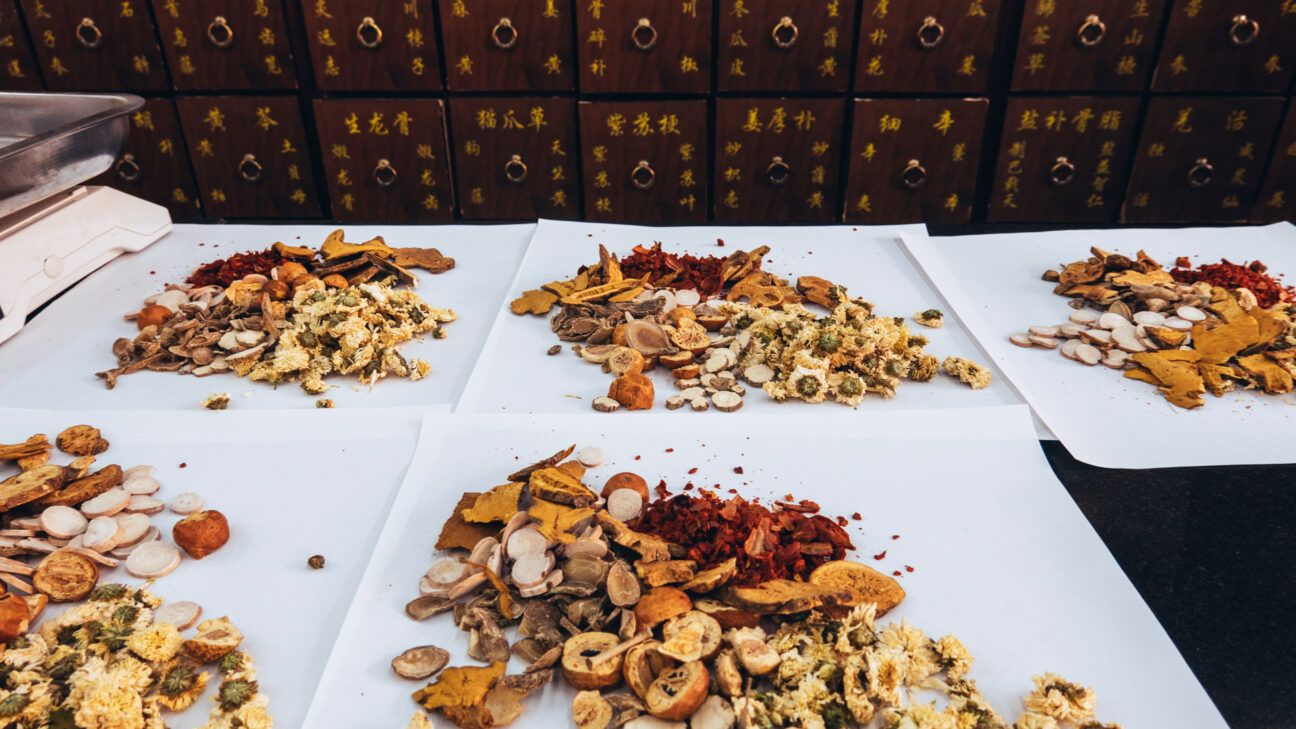Research suggests that herbs used in traditional Chinese medicine may be effective in relieving symptoms of eczema.

Eczema is an inflammatory disease that causes dry skin, itching, rashes, and other symptoms. While there’s no cure for eczema, traditional and alternative treatments may help relieve symptoms.
Traditional Chinese medicine (TCM) is an alternative treatment that’s often used for eczema. This alternative medical practice originating from China has existed for thousands of years. It uses a holistic approach that combines herbs, acupuncture, and other therapies to treat various conditions, including eczema.
This article takes a look at how TCM may be used to relieve symptoms of eczema.
TCM treats eczema, also known as atopic dermatitis, through a mixture of the following products or therapies:
- lotions
- creams
- baths
- teas
- pills
- acupuncture
- acupressure
Combining these treatments aims to calm a person’s immune system and make it less reactive to environmental and food allergies.
When using TCM as a treatment for eczema, practitioners can adjust the formula, including the ingredients and amount, to address an individual’s skin condition and other factors that may be worsening symptoms.
Fang Feng (Saposhnikovia divaricata)
According to
Fang feng is applied topically (on the skin) to treat eczema.
Gan Cao (Radix glycyrrhizae)
A
Huang Qin (Scutellaria baicalensis)
According to a
Huang Qin is topically applied to the skin as a paste or cream. It may also be taken orally.
Mu Dan Pi (Moutan Cortex Radicis)
A 2020 study reveals that this Chinese herb contains compounds that lower symptoms of inflammation. It’s used to treat inflammatory and autoimmune diseases like eczema.
Yi Yi Ren (Coicis Semen)
Yi Yi Ren is sourced from dried seeds of the Coix lacrymal-jobi plant.
According to a 2020 study, Yi Yi Ren has been shown to regulate the immune system and lower the inflammation that occurs with eczema. The herb is safe to take orally or externally.
Mu Li (Concha Ostreae)
A 2022 study found that Mu Li contains anti-inflammatory, antibacterial, and anti-allergen properties. While, not an herb — it’s actually ground oyster shells — the study showed that it had a 70% success rate among people with atopic dermatitis and helped to lower symptoms of chronic itching.
People may apply it directly to their skin or take it orally.
Ci Shi (Magnetite)
The immunosuppressive properties (properties that decrease the intensity of the body’s immune response) of Ci Shi might increase the success of treatments for allergic diseases like eczema. This mineral is available as an oral supplement or as a topical soaking solution.
Zi Cao (Radix arnebiae)
A
Research has found that Traditional Chinese medicine herbs and minerals may be effective in treating eczema.
According to a 2020 study, Qinzhuliangxue decoction (QZLXD), a recipe involving ingredients from TCM, may address some of the symptoms and complications of eczema.
The study involving 176 study participants with subacute atopic eczema revealed that QZLXD relieved symptoms, and lowered chances of relapse.
A 2022 study, which looked at 662 people (322 in the experimental group and 340 in the control group), also suggests that TCM ingredients may lower the size and severity of skin lesions (abnormal skin changes) and improve sleep quality among study participants with atopic dermatitis.
While using TCM seems to be effective for managing eczema symptoms, the National Center for Complementary and Integrative Health (NCCIH) reports that certain Chinese herbal products may
- toxic compounds
- heavy metals, such as cadmium, lead, and arsenic
- pesticides
- microorganisms
- minor aches and pains
- asthma
- severe allergic reactions
- organ damage
It’s a good idea to talk with a doctor before pursuing TCM for eczema or other medical conditions.
While
- hypnosis
- natural oils, including coconut oil and sunflower oil
- certain diets, such as dairy-free, gluten-free, low allergen, sugar-free, and others
- probiotics
- vitamins
B12 andD - wet wraps
- tea tree baths
- colloidal oatmeal baths
This article from the American Academy of Dermatology also provides helpful home remedy suggestions for parents of children with itchy eczema.
Navigating alternative treatments for eczema relief might be challenging. A doctor or dermatologist can give professional insight into what alternative treatments are safe and effective for you.
Traditional Chinese medicine is a popular alternative medicine for treating various medical conditions, including eczema. Certain Chinese herbs contain anti-inflammatory, antibacterial, and anti-allergen properties that may prevent or alleviate eczema treatment.
While TCM seems to be effective, caution is advised as contaminated herbal products might cause unwanted side effects that range from mild to severe.
Before exploring TCM, talk with a doctor to see if this alternative form of medicine is an appropriate treatment for your eczema.









